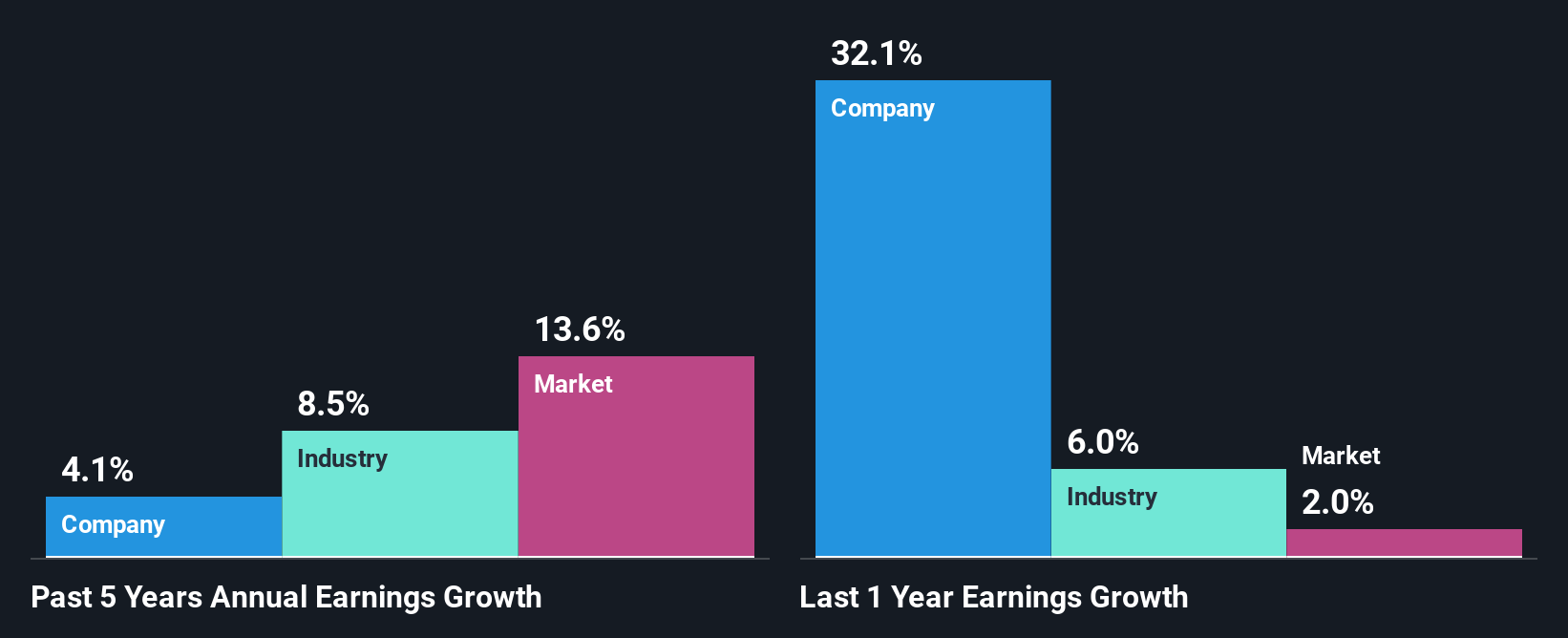- Malaysia
- /
- Electric Utilities
- /
- KLSE:TENAGA
Are Poor Financial Prospects Dragging Down Tenaga Nasional Berhad (KLSE:TENAGA Stock?
With its stock down 9.5% over the past three months, it is easy to disregard Tenaga Nasional Berhad (KLSE:TENAGA). We decided to study the company's financials to determine if the downtrend will continue as the long-term performance of a company usually dictates market outcomes. Specifically, we decided to study Tenaga Nasional Berhad's ROE in this article.
ROE or return on equity is a useful tool to assess how effectively a company can generate returns on the investment it received from its shareholders. Simply put, it is used to assess the profitability of a company in relation to its equity capital.
How To Calculate Return On Equity?
ROE can be calculated by using the formula:
Return on Equity = Net Profit (from continuing operations) ÷ Shareholders' Equity
So, based on the above formula, the ROE for Tenaga Nasional Berhad is:
7.5% = RM4.8b ÷ RM63b (Based on the trailing twelve months to June 2025).
The 'return' refers to a company's earnings over the last year. Another way to think of that is that for every MYR1 worth of equity, the company was able to earn MYR0.08 in profit.
See our latest analysis for Tenaga Nasional Berhad
What Has ROE Got To Do With Earnings Growth?
Thus far, we have learned that ROE measures how efficiently a company is generating its profits. Based on how much of its profits the company chooses to reinvest or "retain", we are then able to evaluate a company's future ability to generate profits. Assuming all else is equal, companies that have both a higher return on equity and higher profit retention are usually the ones that have a higher growth rate when compared to companies that don't have the same features.
A Side By Side comparison of Tenaga Nasional Berhad's Earnings Growth And 7.5% ROE
When you first look at it, Tenaga Nasional Berhad's ROE doesn't look that attractive. However, given that the company's ROE is similar to the average industry ROE of 8.8%, we may spare it some thought. On the other hand, Tenaga Nasional Berhad reported a fairly low 4.1% net income growth over the past five years. Remember, the company's ROE is not particularly great to begin with. So this could also be one of the reasons behind the company's low growth in earnings.
Next, on comparing with the industry net income growth, we found that Tenaga Nasional Berhad's reported growth was lower than the industry growth of 8.5% over the last few years, which is not something we like to see.

Earnings growth is an important metric to consider when valuing a stock. It’s important for an investor to know whether the market has priced in the company's expected earnings growth (or decline). By doing so, they will have an idea if the stock is headed into clear blue waters or if swampy waters await. One good indicator of expected earnings growth is the P/E ratio which determines the price the market is willing to pay for a stock based on its earnings prospects. So, you may want to check if Tenaga Nasional Berhad is trading on a high P/E or a low P/E, relative to its industry.
Is Tenaga Nasional Berhad Efficiently Re-investing Its Profits?
The high three-year median payout ratio of 74% (that is, the company retains only 26% of its income) over the past three years for Tenaga Nasional Berhad suggests that the company's earnings growth was lower as a result of paying out a majority of its earnings.
Additionally, Tenaga Nasional Berhad has paid dividends over a period of at least ten years, which means that the company's management is determined to pay dividends even if it means little to no earnings growth. Upon studying the latest analysts' consensus data, we found that the company is expected to keep paying out approximately 62% of its profits over the next three years. As a result, Tenaga Nasional Berhad's ROE is not expected to change by much either, which we inferred from the analyst estimate of 7.8% for future ROE.
Summary
Overall, we would be extremely cautious before making any decision on Tenaga Nasional Berhad. As a result of its low ROE and lack of much reinvestment into the business, the company has seen a disappointing earnings growth rate. We also studied the latest analyst forecasts and found that the company's earnings growth is expected be similar to its current growth rate. To know more about the company's future earnings growth forecasts take a look at this free report on analyst forecasts for the company to find out more.
Valuation is complex, but we're here to simplify it.
Discover if Tenaga Nasional Berhad might be undervalued or overvalued with our detailed analysis, featuring fair value estimates, potential risks, dividends, insider trades, and its financial condition.
Access Free AnalysisHave feedback on this article? Concerned about the content? Get in touch with us directly. Alternatively, email editorial-team (at) simplywallst.com.
This article by Simply Wall St is general in nature. We provide commentary based on historical data and analyst forecasts only using an unbiased methodology and our articles are not intended to be financial advice. It does not constitute a recommendation to buy or sell any stock, and does not take account of your objectives, or your financial situation. We aim to bring you long-term focused analysis driven by fundamental data. Note that our analysis may not factor in the latest price-sensitive company announcements or qualitative material. Simply Wall St has no position in any stocks mentioned.
About KLSE:TENAGA
Tenaga Nasional Berhad
Engages in the generation, transmission, distribution, and sale of electricity in Malaysia, the United Kingdom, Kuwait, the Republic of Ireland, Australia, and internationally.
Very undervalued with solid track record and pays a dividend.
Market Insights
Community Narratives





